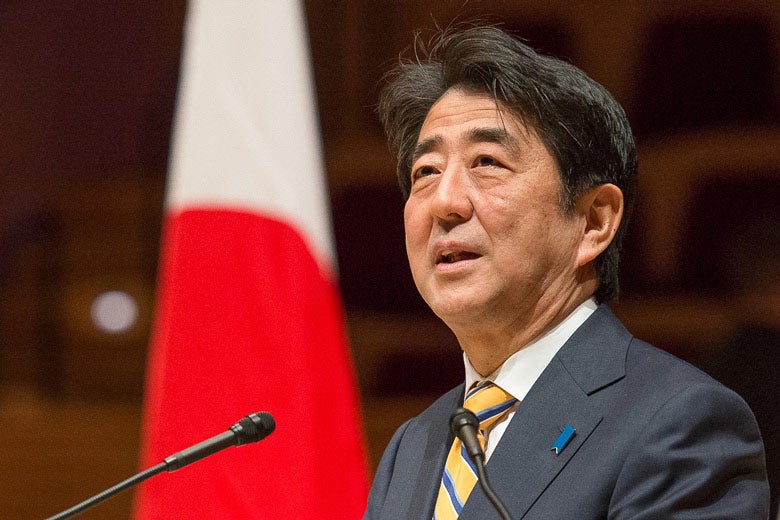|
May 19, 2015
Stanford scholars offer their own visions of Japan's upcoming statement on World War II
Stanford experts believe the Japanese prime minister must send the right message regarding his country's World War II aggressions in a forthcoming statement on the 70th anniversary of the global conflict. By Clifton B. Parker

Japanese Prime Minister Shinzo Abe, shown speaking at Stanford's Bing Concert Hall in April, will issue a statement Aug. 15 on the 70th anniversary of the end of World War II. Stanford experts are urging him to express remorse for Japan's wartime aggressions. (Photo: Linda A. Cicero)
Stanford scholars are urging Japan to take advantage of an upcoming opportunity to show clear, heartfelt remorse for its actions surrounding World War II.
Making such amends will give Japan credibility as it seeks to assume a global leadership role well into the future, they say.
On Aug. 15, Prime Minister Shinzo Abe will publish a short statement to commemorate the 70th anniversary of the end of World War II, which follows similar practices of his predecessors.
Stanford's Walter H. Shorenstein Asia-Pacific Research Center (APARC), which has long advocated wartime reconciliation in Asia, recently issued a 15-page report featuring eight hypothetical statements suggesting what the Japanese prime minister might say in his August address. The report, which is available in both English and Japanese, was recently made available to academics, media and the general public and has already received interest from the Japanese media.
The wording of Abe's statement will be scrutinized by governments and experts in Asia and around the world, the Stanford scholars say. During WWII, China and Korea, as well as other Asian nations, endured brutal Japanese military occupations.
"Many have been speculating what the (Abe) statement will be like," wrote Takeo Hoshi, director of the Japan Program at the Shorenstein Center, and APARC associate director for research Daniel Sneider in the report.
For example, Hoshi and Sneider asked, will Abe follow the direction set by prior Japanese prime ministers by expressing remorse for the suffering of Japan's Asian neighbors while apologizing for past aggression and colonization? Future collaboration in world affairs is also important, they added.
"We asked our colleagues what they would say in the 70th anniversary statement if they were the prime minister of Japan, and to write their own version of the statement," Hoshi and Sneider wrote.
"Our goal is to understand the diversity of reasonable views on the issue of Japan's responsibility for the cruel and violent war and Japan's role in building a peaceful and prosperous world," Hoshi and Sneider said.
The Stanford experts who wrote the statements included Hoshi and Sneider as well as Alberto Diaz-Cayeros, a senior fellow at the Freeman Spogli Institute for International Studies; Peter Duus, a professor emeritus of Japanese history; Thomas Fingar, a distinguished fellow at the Freeman Spogli Institute; David Holloway, a professor of international history and of political science; Yong Suk Lee, the SK Center Fellow at the Freeman Spogli Institute; and Harry Rowen, a professor of public policy and management.
For example, Fingar said in his version, "Let us also resolve to make the 80th anniversary of World War II the 10th anniversary of a more cooperative, more inclusive, and more secure region," and Hoshi wrote in his version, "To avoid any potential misunderstandings, Japan needs to recall past failures, remember the suffering of neighboring Asian peoples, and reaffirm the commitment to world peace more than ever."
On the subject of women, Lee's version noted, "The war and Japan's colonial rule created much suffering, but I would like to especially ask forgiveness to the women from many nations who suffered under colonial rule."
In August 2014, the Shorenstein Asia-Pacific Research Center issued a report on a Stanford-hosted dialogue on World War II memories in northeast Asia. Heightened tensions the last few years among the governments of China, Japan and South Korea have revolved around territorial disputes and the way WWII is portrayed in speeches and educational materials.
"Each nation in northeast Asia and even the U.S. has selective or divided memories of the past, and does not really understand the views of the other side," said Stanford's Gi-Wook Shin, director of the Shorenstein center, in a 2014 Stanford news release.
-30-
|